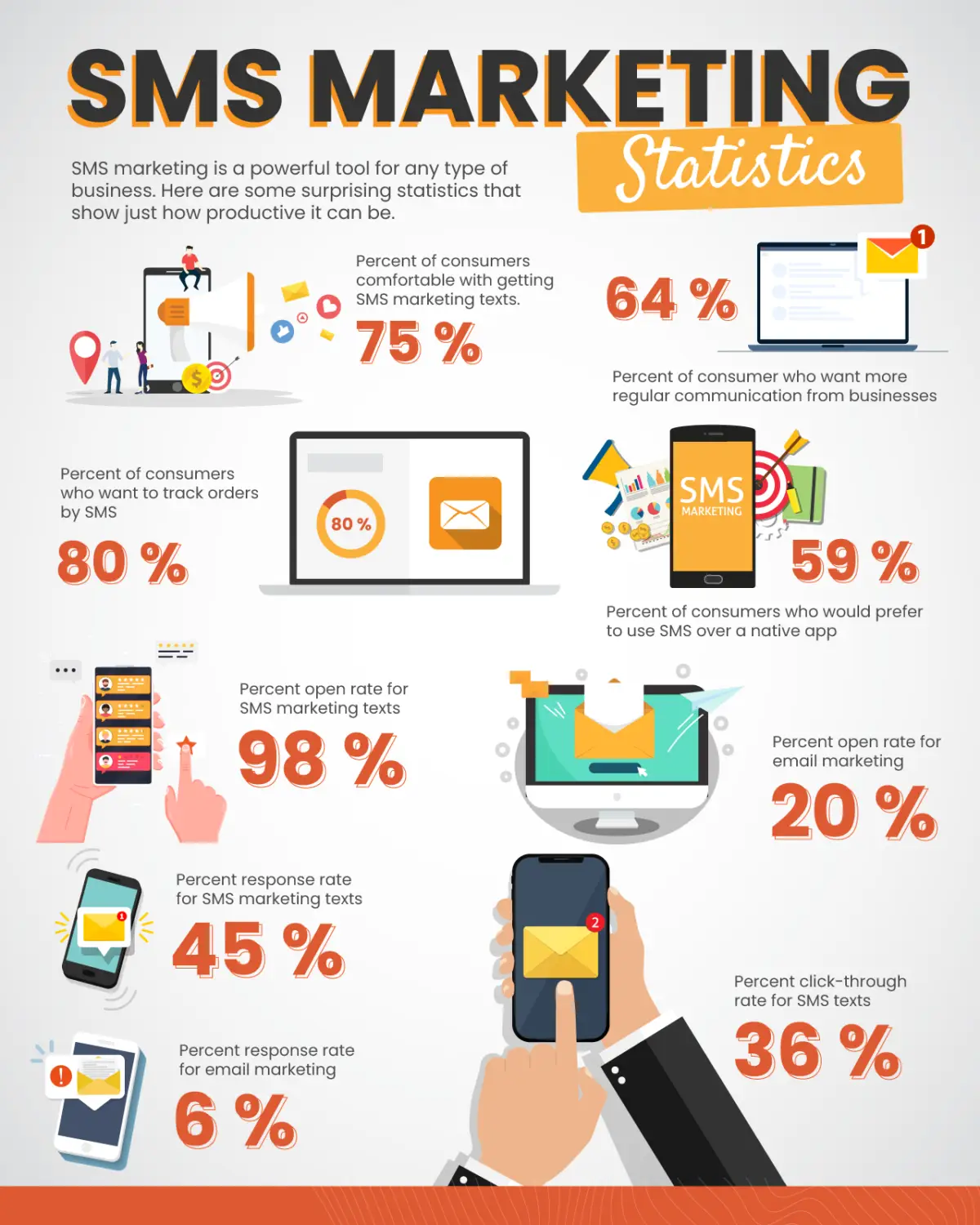
In today’s digital age, effective marketing strategies can make all the difference for small and local restaurants. One powerful tool that has gained significant popularity is SMS marketing. With its high open rates and immediate reach, SMS marketing can help small restaurants increase their customer base, boost engagement, and drive revenue. In this comprehensive guide, we will delve into the world of SMS marketing for restaurants, providing insights, tips, and a recommended all-in-one marketing solution, RepRx.io, specifically designed for the restaurant industry.
Section 1: Understanding the Power of SMS Marketing for Local Restaurants
- The advantages of SMS marketing: high open rates, immediate reach, and direct communication.
- SMS marketing offers several advantages over traditional marketing channels. Firstly, SMS messages have an incredibly high open rate of around 98% compared to email marketing, which has an average open rate of just 20%. This means that SMS messages are much more likely to be seen and read by customers. Secondly, SMS messages have an immediate reach, with 90% of text messages being read within three minutes of being received. This makes SMS marketing an excellent tool for time-sensitive promotions or offers. Finally, SMS marketing allows for direct communication between restaurants and their customers, which can help build stronger relationships and increase customer loyalty.
- Why SMS marketing is particularly effective for small and local restaurants.
- Small and local restaurants often have limited marketing budgets, making it challenging to compete with larger chains. SMS marketing offers a cost-effective way for small restaurants to reach their target audience and drive sales. Additionally, SMS marketing allows restaurants to communicate directly with their customers, which can help build a loyal customer base and increase repeat business.
- Statistics and success stories showcasing the impact of SMS marketing on restaurant businesses.
- Several studies have shown the effectiveness of SMS marketing for restaurants. According to a survey by OpenMarket, 75% of consumers would like to receive offers via SMS, while 76% of consumers have made a purchase after receiving an SMS promotion. Another study by EZ Texting found that restaurants that use SMS marketing see an average redemption rate of 22%, compared to just 2.6% for email marketing. Additionally, several restaurants have reported significant success with SMS marketing, such as Papa John’s, which saw a 33% increase in sales after implementing an SMS campaign.
- Introduction to RepRx.io: an all-in-one marketing solution designed by a restaurant, for restaurants.
-
- RepRx.io is an all-in-one marketing solution designed specifically for the restaurant industry. The platform offers several features to help restaurants increase their customer base, boost engagement, and drive revenue, including SMS marketing, email marketing, social media management, and reputation management. RepRx.io is designed to be easy to use, even for those with limited marketing experience, and offers customizable templates and automated campaigns to help restaurants save time and effort. Additionally, RepRx.io offers detailed analytics and reporting to help restaurants track their marketing efforts and make data-driven decisions.
Section 2: Getting Started with SMS Marketing
- Building your SMS subscriber list:
One of the best practices for building an SMS subscriber list is to make the opt-in process as simple and straightforward as possible. This means providing clear information about what subscribers can expect to receive and how often they will receive messages. It is also important to provide an easy opt-out option for subscribers who no longer wish to receive messages.
Opt-in methods can include online sign-ups, in-store sign-ups, and text-to-join campaigns. Text-to-join campaigns allow customers to opt-in by sending a text message to a specific number with a keyword. For example, a restaurant might ask customers to text the word “PIZZA” to a certain number to receive updates on specials and promotions.
Compliance with local regulations is crucial when building an SMS subscriber list. In the United States, the Telephone Consumer Protection Act (TCPA) requires businesses to obtain prior express written consent from customers before sending them marketing messages. This means that businesses must have a record of each customer’s opt-in, including the time and date of the opt-in and the method used.
- Crafting compelling SMS messages:
SMS messages should be concise and engaging to capture the attention of subscribers. This means using short, easy-to-read sentences and including a clear call-to-action. For example, a retail store might send a message that says “Don’t miss our end-of-season sale! Get 20% off all items in-store this weekend. Show this text at checkout to redeem.”
It can also be helpful to use emojis and multimedia elements like images and GIFs to make messages more visually appealing. However, it is important to use these elements sparingly and only when they add value to the message.
- Personalization strategies:
Personalization can make SMS campaigns more effective by making messages feel more relevant and tailored to individual subscribers. This can include using the subscriber’s name in the message, referencing previous purchases or interactions with the business, and segmenting subscribers based on their interests or behaviors.
For example, a clothing retailer might send a message to subscribers who have previously purchased women’s clothing with a promotion for a new line of women’s dresses. The message could start with “Hey Sarah, we know you love our women’s clothing. Check out our new line of dresses and get 10% off your purchase this week.”
- The importance of timing:
Timing is crucial when it comes to SMS marketing. Messages should be sent at a time when subscribers are most likely to be receptive and able to act on the message. This can vary depending on the audience and the type of message being sent.
For example, a restaurant might send a message promoting a lunch special at 11:00 am, just before the lunch rush. A retailer might send a message promoting a weekend sale on Friday afternoon, when subscribers are starting to make plans for the weekend.
Overall, SMS marketing can be a highly effective way to engage with customers and drive sales. By following best practices for building a subscriber list, crafting compelling messages, personalizing messages, and timing messages appropriately, businesses can maximize the impact of their SMS campaigns.
 Section 3: Leveraging SMS Marketing for Customer Engagement
Section 3: Leveraging SMS Marketing for Customer Engagement
- Using SMS to promote special offers, discounts, and limited-time deals:
SMS marketing is an effective way to promote special offers, discounts, and limited-time deals to customers. Brands can send text messages to their subscribers with exclusive promo codes, flash sales, and limited-time deals. For example, a fashion retailer can send a text message to its subscribers with a promo code for a 20% discount on their next purchase. This can help drive sales and increase customer engagement.
- Encouraging customer loyalty through SMS-based rewards programs and exclusive perks:
SMS-based rewards programs can help brands encourage customer loyalty and increase engagement. Brands can offer exclusive perks and rewards to their subscribers, such as early access to new products, free samples, and personalized offers. For example, a beauty brand can offer its subscribers a free sample of a new product and a personalized discount code for their next purchase. This can help build brand loyalty and drive repeat purchases.
- Soliciting customer feedback and reviews through SMS surveys and request messages:
SMS surveys and request messages can help brands gather customer feedback and reviews. Brands can send text messages to their subscribers asking for feedback on their products or services. They can also request customers to leave a review on their website or social media pages. For example, a restaurant can send a text message to its customers asking them to rate their dining experience and leave a review on their website or social media pages. This can help brands improve their products and services and build a positive reputation.
- Creating a sense of urgency and driving immediate action with well-timed SMS campaigns:
SMS campaigns can create a sense of urgency and drive immediate action from customers. Brands can send time-sensitive messages to their subscribers, such as flash sales, limited-time offers, and event invitations. For example, a concert promoter can send a text message to its subscribers with an exclusive pre-sale code for an upcoming concert. This can help drive ticket sales and increase customer engagement. According to a study by Mobile Marketing Watch, SMS messages have a 98% open rate, making it an effective way to reach customers and drive action.
Section 4: Maximizing Revenue with SMS Marketing
- Leveraging SMS to drive reservations and increase table bookings:
SMS marketing can be a powerful tool to increase reservations and table bookings for restaurants. By sending targeted messages to customers who have opted-in to receive SMS notifications, restaurants can remind them of upcoming reservations, offer last-minute deals, and promote special events. For example, a restaurant could send an SMS message to customers who have made reservations for the upcoming weekend, reminding them of their booking and offering a discount on appetizers or drinks if they arrive before a certain time. According to a survey by OpenTable, 81% of diners say they are more likely to choose a restaurant that offers mobile notifications and reservations.
- Upselling and cross-selling techniques through targeted SMS offers and promotions:
SMS marketing can also be used to upsell and cross-sell to customers. Restaurants can send targeted messages with special offers and promotions for specific menu items or drinks. For example, a restaurant could send an SMS message to customers who have ordered a certain dish in the past, offering a discount on a new, similar dish. According to a study by Salesforce, personalized SMS messages have a 209% higher response rate than generic messages.
- Promoting special events, seasonal menus, and chef’s specials via SMS messages:
SMS marketing can be an effective way to promote special events, seasonal menus, and chef’s specials. Restaurants can send targeted messages to customers who have shown interest in these types of promotions in the past. For example, a restaurant could send an SMS message to customers who have previously attended a wine tasting event, promoting a new wine pairing menu. According to a study by EZ Texting, SMS messages have an open rate of 98%, making it a highly effective way to reach customers.
- Integrating SMS marketing with online ordering systems for seamless customer experiences:
Restaurants can integrate SMS marketing with their online ordering systems to provide a seamless customer experience. For example, a restaurant could send an SMS message to customers who have placed an online order, confirming the order and providing an estimated delivery time. According to a study by Business Insider, online ordering is expected to grow at an annual rate of 22.3% between 2020 and 2024.
Section 5: Analytics and Optimization for SMS Marketing
- Tracking and analyzing SMS campaign performance using RepRx.io’s robust analytics tools:
RepRx.io offers robust analytics tools that allow restaurants to track and analyze the performance of their SMS campaigns. Restaurants can track metrics such as open rates, click-through rates, and conversion rates to optimize their campaigns for maximum effectiveness.
- Strategies for optimizing SMS marketing campaigns based on customer responses and engagement metrics:
Restaurants can use customer responses and engagement metrics to optimize their SMS marketing campaigns. For example, if a certain promotion is receiving a high response rate, the restaurant could consider extending the promotion or offering it again in the future.
- A/B testing ideas for SMS messages, call-to-action buttons, and promotional offers:
A/B testing can be a powerful tool for optimizing SMS marketing campaigns. Restaurants can test different SMS messages, call-to-action buttons, and promotional offers to see which ones perform best. For example, a restaurant could test two different promotional offers and send them to different segments of their customer base to see which offer receives a higher response rate.
- Continuous improvement: leveraging data insights to refine your SMS marketing strategy:
By continuously analyzing data insights and making adjustments to their SMS marketing strategy, restaurants can ensure that their campaigns are always optimized for maximum effectiveness. For example, if a certain promotion is not receiving a high response rate, the restaurant could adjust the promotion or try a different approach.
In conclusion, SMS marketing can be a powerful tool for restaurants to increase reservations, upsell and cross-sell to customers, promote special events and seasonal menus, and provide a seamless customer experience. With RepRx.io’s robust analytics tools and strategies for optimization through A/B testing and continuous improvement, restaurants can ensure that their SMS marketing campaigns are always optimized for maximum effectiveness. With the high open rates and response rates of SMS messages, it’s a no-brainer for restaurants to implement SMS technology in their marketing strategy. Don’t miss out on the opportunity to engage with your customers and drive revenue through SMS marketing.
